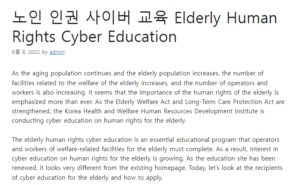As the aging population continues and the elderly population increases, the number of facilities related to the welfare of the elderly increases, and the number of operators and workers is also increasing. It seems that the importance of the human rights of the elderly is emphasized more than ever. As the Elderly Welfare Act and Long-Term Care Protection Act are strengthened, the Korea Health and Welfare Human Resources Development Institute is conducting cyber education on human rights for the elderly.
The elderly human rights cyber education is an essential educational program that operators and workers of welfare-related facilities for the elderly must complete. As a result, interest in cyber education on human rights for the elderly is growing. As the education site has been renewed, it looks very different from the existing homepage. Today, let’s look at the recipients of cyber education for the elderly and how to apply.
1. Those who take cyber education for the elderly
– The human rights cyber education for the elderly is an education that can improve the sensitivity of elderly welfare facility operators and workers to the human rights of the elderly through basic education on human rights for the elderly and broaden the understanding of the elderly based on human rights. Since the target audience for each course is slightly different for the elderly human rights cyber education, let’s take a look at the compulsory courses.
1.1. The first step towards the human rights of the elderly (facilities used) 노인 인권 사이버 교육
– Operators and workers of facilities that use leisure welfare facilities for the elderly, such as senior welfare centers, specialized agencies for the protection of the elderly, job support agencies for the elderly, home elderly welfare facilities such as visiting nursing and visiting nursing, etc., must take the first step towards human rights for the elderly You must take it with
1.2. The first step towards the human rights of the elderly (living facilities) 좋은 뉴스
– Operators and workers of living facilities such as residential welfare facilities for the elderly, such as nursing homes and shared living homes for the elderly, medical welfare facilities for the elderly such as nursing facilities, and shelters for the abused elderly, must take the first step in the human rights of the elderly. You must.
1.3. The first step toward human rights for the elderly (visiting care service)
– Operators and practitioners of visiting nursing services such as visiting nursing, visiting bathing, and visiting nursing services must take the first step in visiting nursing services for the human rights of the elderly.
1.4. The first step toward human rights for the elderly (day and night protection service)
– Day and night protection service operators and workers must take the day and night protection service, the first step in the human rights of the elderly.
1.5. Person obligated to report elder abuse
– Persons obligated to report elder abuse, medical personnel, workers in welfare facilities for the elderly, public officials in charge of social welfare, and workers in long-term care institutions must take the education of persons obligated to report elder abuse.
In the education of persons obligated to report elder abuse, it is possible to know the type of elder abuse while attending the education and report elder abuse when it occurs.

2. How to register for the elderly human rights cyber education course
Go to KOHI Human Rights Education
– If you do not have a mobile phone in your name when registering as a member of the website, you must verify the i-PIN.
If you are having trouble with this method, visit the nearest community center and ask if a private IP is possible, and then ask for help.
> Connect to the senior citizen’s human rights cyber education website through the shortcut above. When you log in, the login screen appears first. Please log in by registering as a member.
> The page you see is the main screen of the senior human rights cyber education website. To register for a course that requires learning, click the course application menu or the shortcut menu for human rights education for the elderly right below.
> A human rights education course for the elderly will appear. You can apply for any of these courses. First of all, all training is free of charge and you can take the course for 21 days from the date of application.
The training time is 6 hours per subject and 1 hour for the subject who is obligated to report elder abuse. Click the red button to register for the course you need to take. Please note that you can also cancel your registration here.
> The course search and application page appears. After entering all required fields of applicant information, click the Course Registration button at the bottom.
> Course registration has been completed easily.
3. How to take the elderly human rights cyber education course
> If you have completed the course registration, you need to study. To take the course, you can click the Learning Status Shortcut button on the course registration completion page above, or click the Learn button on the main screen to go to the current learning page. On the Learn page, click the Learn button for the course you want to take.
> Click the Learn button of the desired course here to play the video course.
4. How to issue a certificate of completion
– When all courses are completed, the Certificate of Completion button is activated. You can then print the certificate of completion. Since the certificate of completion is printed with the affiliation information at the time of application for training, be sure to check the affiliation information before applying for training.